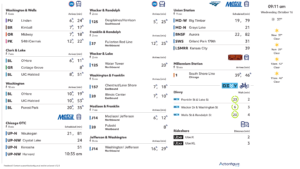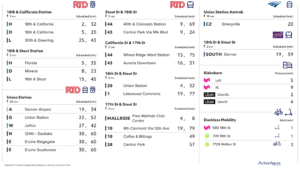Commuter benefits aren’t required in every city or state, but the District of Columbia has a requirement for companies supporting 20 or more employees to offer commuter benefits. DC is one of the most congested cities in the United States, and its commuters can tell you that it gets stressful… fast. This is why we’ve broken down everything you need to know about getting your employees around in DC!
Alternative transportation options are so important in today’s world. Commutes are reaching all-time highs (up to 3 hours one way!), and your employees are getting tired of sitting in traffic, paying for gas, tolls, and parking.

DC is helping commuters cut travel times and costs by having employers offer at least one of these benefits: employer-paid direct benefit, employer-provided transit, and/or an employee-paid pre-tax benefit.
What are commuter benefits?
Commuter benefits provide tax-exempt funds removed from an employee’s paycheck, and in DC an individual can deduct up to $270/month starting in 2020. That comes in handy for those who travel in and out of the city from Maryland or Northern Virginia, where your Metro fare costs more than if you were only going a couple of stops. Fun fact: DC drivers spend 65 hours a year looking for parking, which adds up to $1,367 every year, according to an INRIX study.
Currently, about 40% of Washingtonians drive to work, but the city has a goal to cut that number down to just 25%. Offering the right kinds of commuter benefits for your employees can certainly help with this goal, but it will also help you and your team!
It all starts with parking
 A great example of this is a parking cash-out program, where you can give employees money back for not driving to work. Running an incentive-based program can combat the current issue of subsidized parking that’s been contradicting DC’s environmental and energy goals. Hundreds of government employees are being offered parking at reduced prices, so they’re choosing to drive instead of taking an alternate mode of transportation.
A great example of this is a parking cash-out program, where you can give employees money back for not driving to work. Running an incentive-based program can combat the current issue of subsidized parking that’s been contradicting DC’s environmental and energy goals. Hundreds of government employees are being offered parking at reduced prices, so they’re choosing to drive instead of taking an alternate mode of transportation.
The Coalition for Smarter Growth found that 73% of DC residents being offered free parking at work choose to drive — which makes sense, right? The cost of living in the city isn’t cheap, so people are going to save money wherever they can. But this issue extends outside of DC — employers everywhere offer subsidized or free parking, but talk about wanting to do right by their employees and the environment.
Pre-tax benefits
That’s why it’s important to offer the right commuter benefits. Here are the different transportation choices that can be pre-taxed:
- Vanpool: Can benefit employees who don’t live near many public transit options, employees who live near each other and really only have access to toll roads, or if your office isn’t located in walking distance to any pubic transit. Learn more about vanpool here!
- Bus / Streetcar: Buses are getting faster, cleaner, and smarter about their routes. Offering pre-tax benefits for DC’s bus system just makes sense with them reaching just about every corner.
- Metro: Going underground is a great way to avoid traffic and can really come in handy for those who don’t live in the city, but work there.
- Train: This can benefit employees who need to use Virginia Railway Express or Amtrak for their longer commutes.
Get your employees biking to work
Pre-tax isn’t the only way to go, though. Have you heard why your employees should wheely be biking to and from work? Happy workers are better workers, and one of the biggest issues facing solo drivers is stress. If your employees aren’t coming into work with a clear head, then you’re not getting the most productive team.
 Capital Bikeshare has more than 500 bike stations in Maryland, DC, and Northern Virginia. The best part: They offer partnerships with corporate workplaces to provide access to their bikes at a discounted rate to employees. Pick from four different program levels — platinum, gold, silver, and bronze — depending on how much of the membership fee the organization chooses to cover (which could be all of it).
Capital Bikeshare has more than 500 bike stations in Maryland, DC, and Northern Virginia. The best part: They offer partnerships with corporate workplaces to provide access to their bikes at a discounted rate to employees. Pick from four different program levels — platinum, gold, silver, and bronze — depending on how much of the membership fee the organization chooses to cover (which could be all of it).
Biking helps get people energized for the day while they zoom past car after car in the bike lane. Even more employees would be willing to bike to work if they had access to showers on site. Don’t have physical space or money in the budget for showers? We’ve got a few more alternatives that pack a punch .
Don’t feel like sweating on your way to work? Help your employees cover the cost of electric JUMP bikes or e-scooters like Bird, SPIN, Skip, Lime, Bolt, Lyft scooters, and JUMP scooters. While these are not covered under the current commuter benefit programs in DC, that doesn’t mean you can’t subsidize or allow employees to expense their rides. This is particularly easy if you already offer employees deals with ridesharing companies like Uber and Lyft, both of which provide direct access to scooters through their apps.
At the end of the day…
Commuter benefits may be a requirement for most companies in the DC area, but it can be a great way to go above and beyond with your employees to make them feel supported. People want to work for companies that are invested in their future, their benefits, and their commutes. Supported employees means less turnover and increased productivity, and that’s the name of the game.
UPDATE about Transportation Demand Management in DC:
Washington, D.C. recently passed a parking cash-out bill for employers with 20 or more employees. The law requires covered employers to make up the difference of cost between their monthly parking spots and their commuter benefits for non-drivers.
Employers can make up the difference by offering clean air transportation fringe benefits, paying a clean air compliance fee, or implementing a transportation demand management (TDM) plan. Follow the link below to read more about the Transportation Benefits Equity Amendment Act of 2019.




